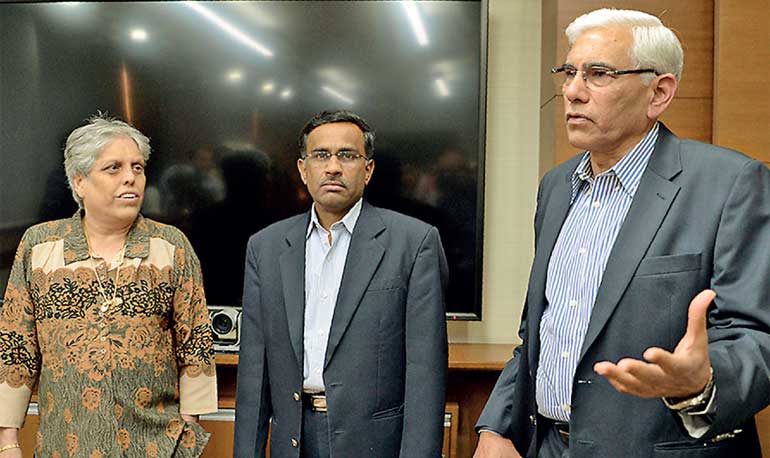Saturday Feb 21, 2026
Saturday Feb 21, 2026
Friday, 24 March 2017 01:19 - - {{hitsCtrl.values.hits}}
ESPNcricinfo: The Committee of Administrators has said that it would prefer to work with the BCCI’s state cricket associations – as opposed to confronting them – to put the Lodha Committee reforms into practice.
The Supreme Court had ordered several changes to the functioning of the Indian board in July last year but none of them have been made yet. Staunch opposition from the state associations has been one of the major reasons for the delay and though the CoA said it did not want to use force, it did make clear the only option available was to comply.
Having been appointed on January 30, the CoA finished 30 days in office on Wednesday and had invited a select group of journalists for an hour-long interaction. “For every objective to be achieved you need to do it in stages,” Chairman Vinod Rai said. “The thing is that at each stage, whatever persuasive power that we need, and I am saying persuasive in inverted commas, we will apply.”
The CoA was set up to both supervise the BCCI – who are without a president or secretary – and help ensure the implementation of the Lodha recommendations. But so far, both the Indian board and its state associations have ignored the deadlines that had been set for them. Even various warnings from the Supreme Court could not spur them to action. So the most asked question to the CoA was how they were going the succeed in the face of such intransigence.
 The Committee of Administrators – Diana Edulji, Vikram Limaye and Vinod Rai – were confident of completing their job by December 2017 – AFP
The Committee of Administrators – Diana Edulji, Vikram Limaye and Vinod Rai – were confident of completing their job by December 2017 – AFP
Rai said he could understand the state associations’ reluctance to change, considering most of them have been governed by the same set of administrators for a long time and they were being asked to leave. “We will try to persuade them to see the writing on the wall. We know what is to be done at what point of time. They have been sitting for 25 years, you are asking them to go. At some point, they will see that that is the end of the road for them. And if they don’t understand it, they will be made to understand in a language they will understand. You cannot have defiance of the highest court of the land. Greater bodies, more authoritative people have tried to defy the Supreme Court and they have not succeeded.
“The only thing is that they have difficulty accepting the practical aspects of it. Hopefully within the course of time they will be able to understand. We will talk to them. They may have some reasonable differences, clarifications etc.. We will try and help them out with it. We will try to bring them around.”
The state associations have filed a fresh set of petitions in the court, on the basis of the argument that Article 19 (1)(c) of the Indian constitution protects their right to form societies and function autonomously. The argument has already been struck down in previous hearings of the case.
Some state associations have also sought clarity on the nine-year cap imposed on a BCCI office bearer, a recommendation that the court had already approved. “If they have genuine problems about understanding it, we will explain. It is our job,” Rai said. “If they still refuse to understand, then of course we will have to make out a road map of how we ask them to implement it.”
Rai, however, insisted the CoA wouldn’t resort to using force to complete their objectives. “There is no question of aggression at all. They [state associations] may not be generous. It is not a question of generosity. They are representing a particular group of people. We don’t have to rely on their generosity. The attempt is to collaborate, cooperate. Cricket has to be delivered to cricket lovers in the form in which they want it. You and I sitting in governance cannot be made into stumbling blocks or road blocks to it because it is not suiting us. Because it is not suiting the way we were accustomed to administer it in the past.”
The other two members of the CoA - Ramachandra Guha and former Indian women’s captain Diana Edulji - also gave their full backing to the collaborative approach. “We want to do it in a consultative way,” Guha said. “We don’t want to do it in a confrontational way. We want to take everyone (on board).”
Upon taking over as chairman of the CoA two months ago, Rai said he saw himself and his colleagues as nightwatchmen. On Wednesday, he was “reasonably confident” of being done with the job by the end of the year.